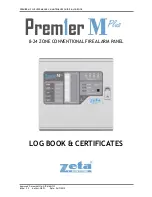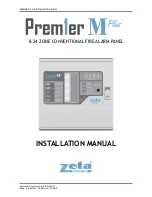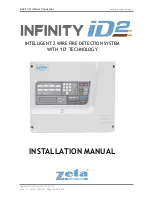
4099-9032 through 4099-9037
IDNet Manual Call Point
Installation Instructions
1998 Simplex Time Recorder Co., Gardner, MA 01441-0001 USA
All specifications and other information shown were current as of publication, and are subject to change without notice.
574-787
Rev. A
Cautions and Warnings
ELECTRICAL HAZARD -
Disconnect electrical power when installing or servicing.
STATIC HAZARD -
Static electricity can damage components. Ground yourself before opening or installing
components.
Introduction
The 4099-9032 through 4099-9037 Series Manual Call Points provide a means to manually initiate a fire alarm
condition to the 4010 Fire Alarm Control Panel (FACP), via the IDNet™ channel. The IDNet channel provides the
communication link between a call point and 4010 FACP and powers the entire circuitry.
Installation
Addressable call point installation consists of the following steps.
1.
Setting the call point address.
2.
Making electrical connections to the call point.
3.
Mechanically installing the call point.
4.
Replacing the glass substitute element with the break glass.
5.
Testing the call point.
1. Setting the Call Point Address
Each call point has a unique address (1 through 250). The address of the call point is set via an eight position DIP
switch (Figure 2), DIP switch position
1
is the least significant bit (LSB) and position
8
is the most significant bit
(MSB). Set the call point address using Figure 2 as a reference. Use a small screwdriver or pen to set the switches.
Configure the call point to the 4010 panel using the
4010 Fire Alarm Panel Programming Instructions
(574-054) and
the
4010 Fire Alarm Installation and Operation Instructions
(574-052). Use device type KACPUL. Refer to the
4010 Panel Label
(526-444) for the appropriate revision of the instructions to be used.
0000 1000 0100 1100 0010 1010 0110 1110 0001 1001 0101 1101 0011 1011 0111 1111
0000
0
16
32
48
64
80
96
112
128
144
160
176
192
208
224
240
1000
1
17
33
49
65
81
97
113
129
145
161
177
193
209
225
241
0100
2
18
34
50
66
82
98
114
130
146
162
178
194
210
226
242
1100
3
19
35
51
67
83
99
115
131
147
163
179
195
211
227
243
0010
4
20
36
52
68
84
100
116
132
148
164
180
196
212
228
244
1010
5
21
37
53
69
85
101
117
133
149
165
181
197
213
229
245
0110
6
22
38
54
70
86
102
118
134
150
166
182
198
214
230
246
1110
7
23
39
55
71
87
103
119
135
151
167
183
199
215
231
247
0001
8
24
40
56
72
88
104
120
136
152
168
184
200
216
232
248
1001
9
25
41
57
73
89
105
121
137
153
169
185
201
217
233
249
0101
10
26
42
58
74
90
106
122
138
154
170
186
202
218
234
250
1101
11
27
43
59
75
91
107
123
139
155
171
187
203
219
235
0011
12
28
44
60
76
92
108
124
140
156
172
188
204
220
236
1011
13
29
45
61
77
93
109
125
141
157
173
189
205
221
237
0111
14
30
46
62
78
94
110
126
142
158
174
190
206
222
238
15
31
47
63
79
95
111
127
143
159
175
191
207
223
239
LSB
MSB
1
2
3
4
5
6
7
8
1111
DIP SWITCHES 5 THRU 8
ON
OFF
1 = ON
0 = OFF
251
252
253
254
255
DIPSWITCH IS SHOWN SET AT ADDRESS 7.
Note:
DIP switch in “1” position is
“ON” while DIP switch in “0”
position is “OFF.”
Figure 3. Call Point Addressing Chart
Figure 2. Rear View of Call Point
Figure 1. Front View of Call Point
(English Version with Glass Installed)
Red IDNet +
Black IDNet -
DIP Switches








